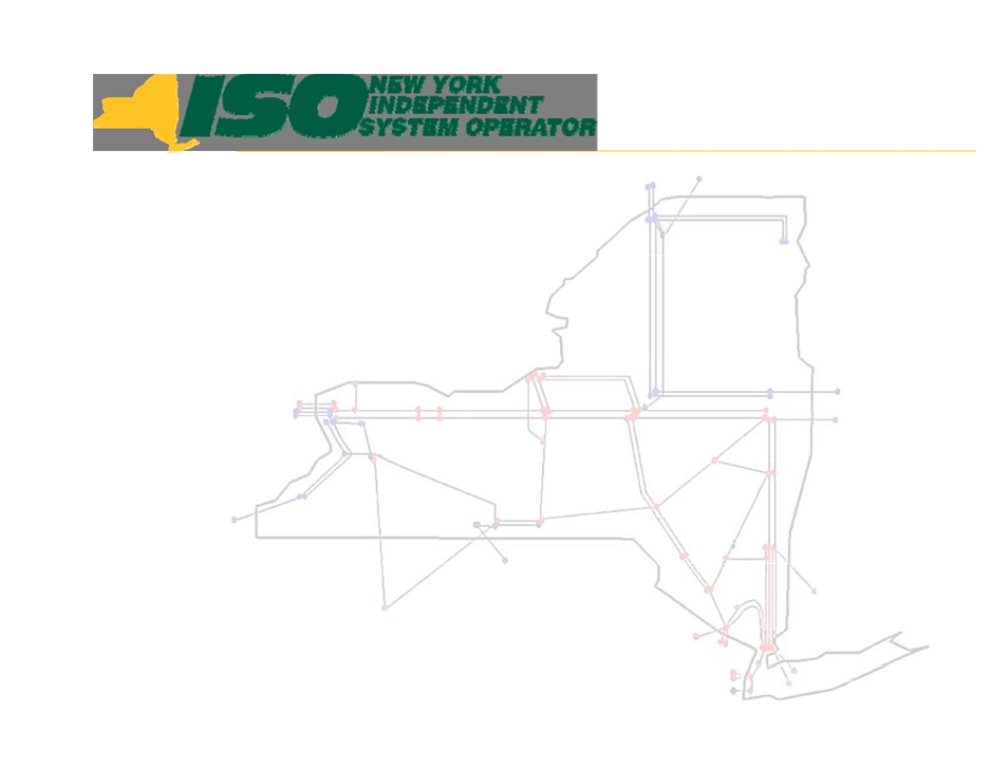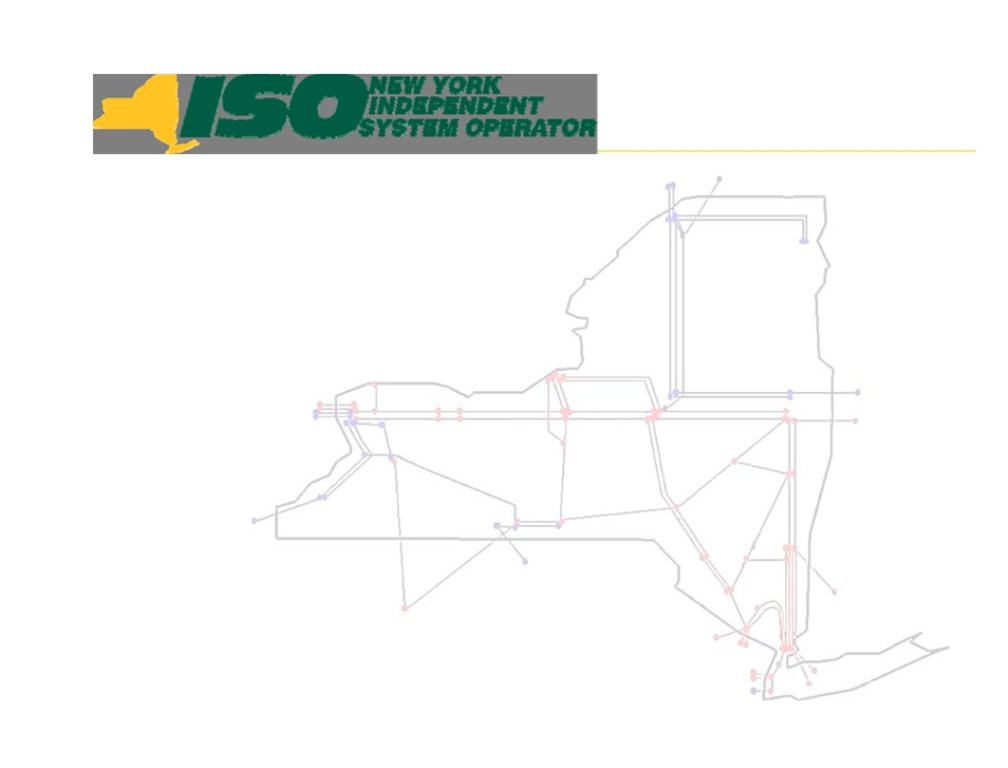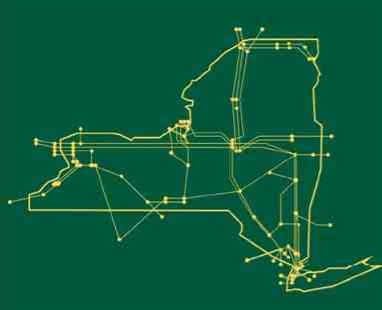
10 Krey Boulevard Rensselaer, NY 12144
December 22, 2011
Submitted Electronically
Kimberly D. Bose
Secretary
Federal Energy Regulatory Commission 888 First Street, N.E.
Washington, D.C. 20426
Re: New York Independent System Operator, Inc.’s Compliance Notice;
Docket No. ER08-1281-___
Dear Ms. Bose:
The New York Independent System Operator, Inc. (“NYISO”) submits this
Compliance Notice (“Notice”) to confirm its timely development of new interface pricing
software to comply with paragraphs 27 and 31 of the Federal Energy Regulatory
Commission’s (“Commission’s”) December 30, 2010 Order on Rehearing and Compliance
that was issued in Docket No. ER08-1281-000, et al. (“December Order”)1 as modified by
paragraph 15 of the Commission’s July 1, 2011 Order on Rehearing (“July Order”).2
I.LIST OF DOCUMENTS SUBMITTED
The NYISO submits the following documents:
1.this filing letter;
2.a September 16, 2011 presentation to the NYISO’s Market Issues Working
Group entitled Interface Pricing, explaining the interface pricing method that the NYISO developed to comply with the December and July Orders (“Attachment I”); and
3. a June 2, 2010 presentation to the NYISO’s Business Issues Committee
entitled Broader Regional Markets, Interface Pricing Revisions, proposing an interface
pricing method to comply with the December and July Orders (“Attachment II”).
1 New York Independent System Operator, Inc., 133 FERC ¶ 61,276 (2010).
2 New York Independent System Operator, Inc., 136 FERC ¶ 61,011 (2011).
Kimberly D. Bose, Secretary December 22, 2011
Page 2
II.OVERVIEW
Consistent with (a) the proposed compliance method described in the NYISO’s
January 31, 2011, Request for Rehearing in Docket No. ER08-1281-007, and (b) the NYISO’s discussions with its stakeholders,3 the NYISO has developed and deployed software that is capable of implementing two distinct methods of pricing and scheduling (“Scheduling
Modes”). If actual power flows through the New York Control Area (“NYCA”) are expected to closely conform to scheduled power flows, the NYISO’s pricing and scheduling will
incorporate that expectation. If the NYISO expects significant unscheduled power flows, the NYISO’s pricing and scheduling will anticipate and account for those unscheduled power flows. In both Scheduling Modes, the established prices will be consistent with the expected location of power delivery and the value of delivery at those locations.
Frequent transitions between the two Scheduling Modes would produce inconsistent
and unpredictable prices and schedules, to the detriment of the interconnected markets.
Instead of resolving seams, frequent changes to the assumptions used to determine prices and
schedules could create a new “seam” between markets. For this reason, the NYISO will
ordinarily determine the Scheduling Mode it will employ on a quarterly basis. The NYISO
will review historical data on unscheduled power flows and will take into consideration
significant changes in system topology4 to determine which Scheduling Mode to employ for
an upcoming quarter.5
In order to promote certainty and transparency, the NYISO will communicate to its
Market Participants and to neighboring Balancing Authorities the Scheduling Mode it intends
to employ in an upcoming quarter in advance of the start of the new quarter. If actual power
flows diverge significantly from the NYISO’s expectations, or if system conditions change
dramatically, in a manner that suggests that the Scheduling Mode that the NYISO selected is
likely to produce inappropriate prices and schedules for a significant period of time, the
NYISO may switch the Scheduling Mode it employs for the remainder of that quarter. The
NYISO will provide as much advance notice to its Market Participants and to neighboring
Balancing Authorities as is practicable, should it determine that changing Scheduling Modes
would significantly improve the conformance of the power flow assumptions used to develop
the NYISO’s prices and schedules with the actual flow of power the NYISO is observing.
3 See Attachments I and II.
4 For example, there may be a change in unscheduled power flows when the Midwest Independent Transmission System Operator, Inc. (“MISO”) and Independent Electricity System Operator of Ontario (“IESO”) begin
operating phase angle regulators (“PARs”) to better conform actual power flows to scheduled power flows at
their common border.
5 The NYISO intends to rely on historical power flow information to make its determination. If the NYISO finds that past data for similar time periods (e.g., data addressing historical unscheduled power flows during the same quarter or season in a prior year or years) produces a more accurate prediction than using more current “rolling” data, the NYISO may instead rely on power flow data for prior like periods.
Kimberly D. Bose, Secretary December 22, 2011
Page 3
III.SCHEDULING MODES
If actual power flows through the NYCA are expected to closely conform to scheduled power flows, the NYISO will employ a Scheduling Mode that incorporates the NYISO’s
expectation that power flows will closely match schedules. The NYISO will commit,
dispatch and price generation and interchange transactions in its Day-Ahead Security
Constrained Unit Commitment (“SCUC”), and in its Real-Time Commitment (“RTC”) and
Real-Time Dispatch (“RTD”) by computing each resource’s incremental impacts on the New York State Transmission System (“NYSTS”) assuming that scheduled flows will be
consistent with their contract path.
If actual power flows through the NYCA are not expected to conform to scheduled
power flows, the NYISO will employ a Scheduling Mode that anticipates and accounts for the
expected deviation between actual and scheduled power flows. SCUC, RTC and RTD will be
configured to represent the incremental power distribution around Lake Erie when computing
each resource’s incremental impacts on the NYSTS. In other words, all generator, load and
proxy generator bus shift factors and delivery (penalty) factors will be computed in a manner
that reflects the expected deviation of scheduled flows from their contract path. This
Scheduling Mode is expected to produce pricing results that are similar to the results
produced by the external interface pricing methods that PJM Interconnection, LLC (“PJM”) and the MISO currently employ. However, this Scheduling Mode is expected to produce less appropriate results than the Scheduling Mode described above when actual power flows
closely conform to scheduled power flows. It is the NYISO’s expectation that when actual power flows closely conform to scheduled power flows, PJM’s and MISO’s prices and
schedules will appropriately reflect such conformity.
IV.CONCLUSION
The NYISO hereby informs the Commission that it has timely developed and
deployed new software capability to comply with the interface pricing requirement set forth in the Commission December and July Orders.
Respectfully submitted,
/s/ Alex M. Schnell
Alex M. Schnell
New York Independent System Operator, Inc.
CERTIFICATE OF SERVICE
I hereby certify that I have this day served the foregoing document upon each person designated on the official service list compiled by the Secretary in this proceeding in accordance with the requirements of Rule 2010 of the Commission Rules of Practice and Procedure, 18 C.F.R. § 385.2010.
Dated at Rensselaer, New York this 22nd day of December, 2011.
/s/ Joy A. Zimberlin
Joy A. Zimberlin
New York Independent System Operator, Inc.
10 Krey Boulevard
Rensselaer, NY 12144
Tel: (518) 356-6207
Fax: (518) 356-7678
E-mail: jzimberlin@nyiso.com
ATTACHMENT I
Interface Pricing
Presentation to Market Issues Working Group
Presented by: Michael DeSocio,
Market Products Specialist
New York Independent System Operator, Inc.

Interface Pricing
Mike DeSocio
Market Product Specialist
New York Independent System Operator
MIWG
September 16, 2011
Rensselaer, New York
Draft - for Discussion Purposes OnlyInterface Pricing
© 2011 New York Independent System Operator, Inc. All Rights Reserved.Broader Regional Markets



Agenda
Interface Pricing Concept Review
Examples
Path Validations
Implementation Timeline
Next Steps
Draft - for Discussion Purposes OnlyInterface Pricing
© 2011 New York Independent System Operator, Inc. All Rights Reserved.Broader Regional Markets2



Interface Pricing Concept
When the Michigan-Ontario control
devices are not available, or are not
effectively managing loop flows around
Lake Erie, the NYISO will:
Apply interface pricing that will represent the
incremental power distribution around Lake Erie
reflecting the inability of the control devices to control
power flows around Lake Erie
• Michigan - Ontario interface will represent incremental power distribution
Draft - for Discussion Purposes OnlyInterface Pricing
© 2011 New York Independent System Operator, Inc. All Rights Reserved.Broader Regional Markets3



Interface Pricing Concept
If the Michigan-Ontario control devices are
installed and demonstrate the ability to
adequately manage loop flows around
Lake Erie, the NYISO will:
Apply interface pricing that will represent the
incremental power distribution around Lake Erie
reflecting the operation of control devices to control
power flows around Lake Erie
Draft - for Discussion Purposes OnlyInterface Pricing
© 2011 New York Independent System Operator, Inc. All Rights Reserved.Broader Regional Markets4



Interface Pricing Concept
Regardless of the installation of control
devices to control loop flows around Lake
Erie, the NYISO will:
Maintain the ability to impose Lake Erie Circulation
onto the power flows to ensure accurate
determination of network constraints
Maintain consistency in treatment between external
transactions and internal resources for both
scheduling and pricing decisions
Draft - for Discussion Purposes OnlyInterface Pricing
© 2011 New York Independent System Operator, Inc. All Rights Reserved.Broader Regional Markets5















Example - Current Method
Draft - for Discussion Purposes OnlyInterface Pricing
© 2011 New York Independent System Operator, Inc. All Rights Reserved.Broader Regional Markets6















Example - New Method
Draft - for Discussion Purposes OnlyInterface Pricing
© 2011 New York Independent System Operator, Inc. All Rights Reserved.Broader Regional Markets7



Path Validations
The NYISO will maintain the existing rules that
preclude the circuitous scheduling of
transactions
If control devices are installed and demonstrate
the ability to adequately manage loop flows
around Lake Erie, the NYISO will analyze the
operation of the devices to determine if they
obviate the need for path validations to prevent
circuitous scheduling
Draft - for Discussion Purposes OnlyInterface Pricing
© 2011 New York Independent System Operator, Inc. All Rights Reserved.Broader Regional Markets8



Implementation Timeline
The NYISO is targeting Q4 2011 for the
software implementation of Interface
Pricing
The NYISO has reviewed the ISO Tariffs
and determined that no tariff amendments
appear necessary to implement Interface
Pricing
Draft - for Discussion Purposes OnlyInterface Pricing
© 2011 New York Independent System Operator, Inc. All Rights Reserved.Broader Regional Markets9



Next Steps
Deploy Software capabilities supporting
Interface Pricing Q4 2011
The NYISO will continue to monitor the
status of the Michigan - Ontario PAR
activation and operation
Draft - for Discussion Purposes OnlyInterface Pricing
© 2011 New York Independent System Operator, Inc. All Rights Reserved.Broader Regional Markets10















The New York Independent System
Operator (NYISO) is a not-for-profit
corporation responsible for operating the state’s bulk electricity
grid, administering New York’s competitive wholesale electricity markets, conducting comprehensive long-term planning for the state’s
electric power system, and
advancing the technological
infrastructure of the electric system
serving the Empire State.
www.nyiso.com
Draft - for Discussion Purposes OnlyInterface Pricing
© 2011 New York Independent System Operator, Inc. All Rights Reserved.Broader Regional Markets11
ATTACHMENT II
Broader Regional Markets, Interface Pricing Revisions
Presentation to Business Issues Committee
Presented by: Robert Pike
Director of Market Design
New York Independent System Operator, Inc.

Broader Regional Markets
Interface Pricing Revisions
Robert Pike
Director, Market Design
New York Independent System Operator
BIC
NYISO - Krey Corporate Center June 2, 2010
© 2000-2009 New York Independent System Operator, Inc. All Rights Reserved.



Objective
As part of the Broader Regional Market (“BRM”) initiative,
NYISO agreed to complete a design concept for Interface
Pricing Revisions (to be used prior to when the Michigan-
Ontario PARs are to be in service) by 2nd Qtr 2010.
Concepts were reviewed at the April 12th MIWG. No
subsequent comments were received.
Will be preparing a report for FERC in July to provide status
updates on the various elements included in BRM.
NYISO wants to ensure it accurately reflects stakeholder
agreement/concerns with these concepts.
Further stakeholder approvals will be required to implement
any modifications.
© 2000-2009 New York Independent System Operator, Inc. All Rights Reserved.2



Recommendation
Today’s discussion is focused on the
alterations to the current pricing
methodology for the existing network
configuration, without the availability
of PAR installations to minimize Lake
Erie Loop Flow.
NYISO continues to work with the other
ISOs to evaluate the appropriate method
to utilize with the Ontario-Michigan PARs
in service.
© 2000-2009 New York Independent System Operator, Inc. All Rights Reserved.3



Proposal
Representation of physical power
distribution
Reflect the physical distribution of power flows
around Lake Erie based upon network topology.
Path Validations
Maintain existing rules that preclude the
circuitous scheduling of transactions.
Proxy Bus Locations
Maintain use of PJM and IESO proxy buses.
Validate network location for bus
representations.
© 2000-2009 New York Independent System Operator, Inc. All Rights Reserved.4



Representation of Network Flows
Reflect the incremental distribution of power flows
around Lake Erie based upon network topology.
Maintain existing allocation of power flows on the NYISO-
PJM PARs. (Technical Bulletin 152 - PJM Proxy Bus
Pricing and Scheduling)
• No incremental power flows will be reflected on the PAR controlled lines interconnecting the NYISO and PJM.
Maintain ability to impose a Lake Erie circulation onto the
power flows to ensure accurate determination of network
constraints.
Maintain consistency in treatment between
external transactions and internal resources for
both scheduling and pricing decisions.
© 2000-2009 New York Independent System Operator, Inc. All Rights Reserved.5



Path Validations
Maintain existing rules that preclude the circuitous
scheduling of transactions.
Circuitous path scheduling is not considered appropriate
in the absence of the ability to conform actual flows to
scheduled flows.
While tag-based settlement and path validations are
intended to produce similar market responses, the NYISO believes a more rigorous implementation is achieved by maintaining the circuitous path prohibitions.
When available, monitor the ability of the IESO-
MISO PARs to maintain actual flow to be
consistent with scheduled interchange and the
capability of the additional Broader Regional
Markets solutions to obviate the need for the path
validations.
© 2000-2009 New York Independent System Operator, Inc. All Rights Reserved.6



Proxy Bus Locations
Due to the PAR controlled nature of the NYISO-
PJM interface, the value of energy delivered from
regions beyond PJM and IESO will be
predominately defined by the delivery path
through PJM or IESO to NYISO.
For example, Midwest ISO power scheduled through PJM
will have different impacts than Midwest ISO power
scheduled through IESO.
Evaluate the appropriate locations for the external
proxy buses to align anticipated distribution of
network power flows delivered from or through
PJM or IESO.
NYISO is not recommending the establishment of
additional proxy bus locations beyond PJM and
IESO at this time.
© 2000-2009 New York Independent System Operator, Inc. All Rights Reserved.7



Implementation Schedule
Concept will require software development
effort that cannot be completed in 2010
Design and evaluation will continue during
2010 with necessary stakeholder reviews
and approvals
Incorporate effort into 2011 Budget
Planning/Project Prioritization
Monitor status of Ontario-Michigan PAR
installation and implementation
© 2000-2009 New York Independent System Operator, Inc. All Rights Reserved.8





The New York Independent
System Operator (NYISO) is a
not-for-profit corporation that
began operations in 1999. The
NYISO operates New York’s bulk
electricity grid, administers the
state’s wholesale electricity
markets, and conducts
comprehensive planning for the
state’s bulk electricity system.
www.nyiso.com

© 2000-2009 New York Independent System Operator, Inc. All Rights Reserved.9





























